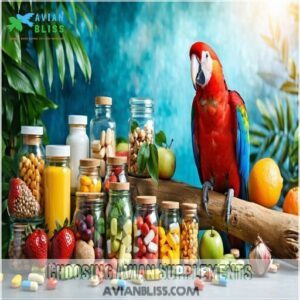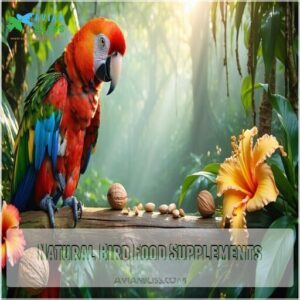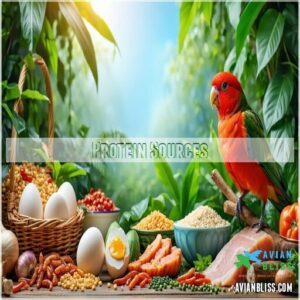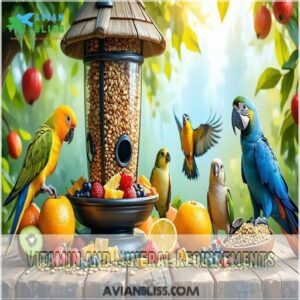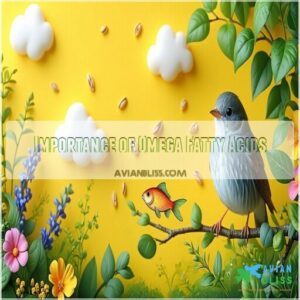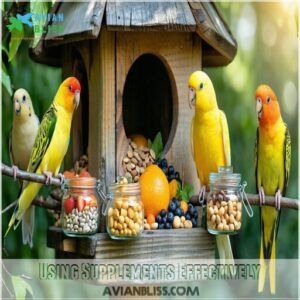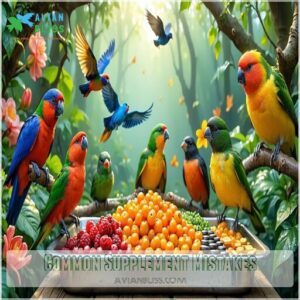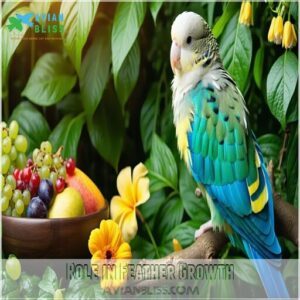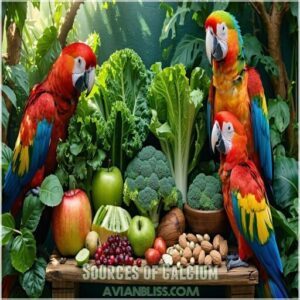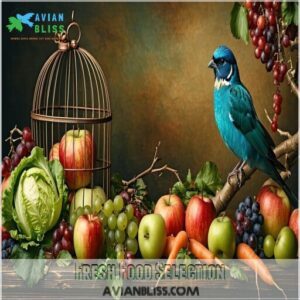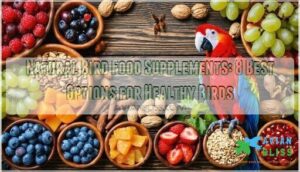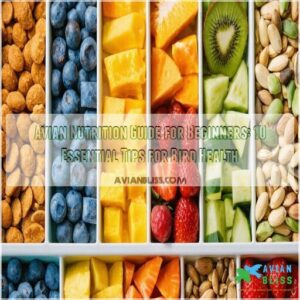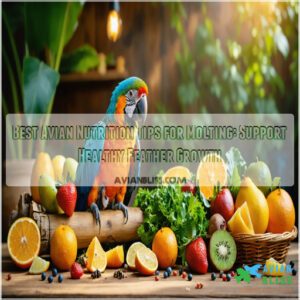This site is supported by our readers. We may earn a commission, at no cost to you, if you purchase through links.
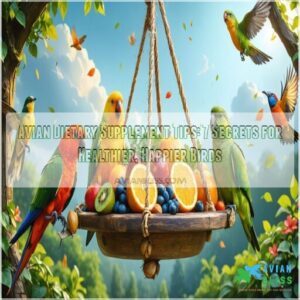
When choosing supplements, consider your bird’s species, age, and health needs. Look for vitamins A, D, and E, and opt for high-quality ingredients without artificial fillers.
Remember, different birds have unique nutrient needs, so it’s vital to get it right. By making informed choices, you’ll be well on your way to providing a balanced diet – and that’s just the beginning of revealing a happier, healthier life for your bird, with more expert advice to come.
Table Of Contents
- Key Takeaways
- Choosing Avian Supplements
- Natural Bird Food Supplements
- Essential Nutrients for Birds
- Using Supplements Effectively
- Common Supplement Mistakes
- Calcium Importance for Birds
- Fresh Food Selection
- Balancing Bird Diets
- Frequently Asked Questions (FAQs)
- What is the most critical nutrient to birds?
- What is the best diet for birds?
- What is the best supplement for fertility in birds?
- What foods support healthy beak growth?
- Can birds eat human vitamin supplements?
- How often should I give treats?
- Are there benefits to feeding live insects?
- Can I make my own bird supplements?
- Conclusion
Key Takeaways
- You’ll want to choose avian dietary supplements based on your bird’s species, age, and health needs, looking for vitamins A, D, and E, and opting for high-quality ingredients without artificial fillers.
- It’s crucial to consider your bird’s unique nutrient needs, as different species have drastically different requirements, and a supplement perfect for one bird might be inappropriate for another.
- You should follow the manufacturer’s instructions for supplement dosage and mixing, and monitor your bird’s health, adjusting their diet as needed to prevent over-supplementation or under-supplementation.
- By adding fresh foods, creating a nutrition plan, and avoiding canned foods, you’ll be able to provide your bird with a well-rounded diet that meets their needs, and you can also consider adding live insects as a nutritious treat to promote healthy growth and development.
Choosing Avian Supplements
You’ll need to match your bird’s supplement to its species, age, and current health needs, just like you wouldn’t give a toddler senior vitamins.
When shopping for avian supplements, look for products with essential vitamins A, D, and E without artificial fillers – your feathered friend’s vibrant plumage and energy levels will thank you, as these elements are crucial for maintaining its overall health and energy levels.
Consider Bird Species and Age
Before selecting avian dietary supplements, understand that different bird species have drastically different nutrient needs.
A supplement perfect for your budgie might be inappropriate for your macaw.
- Your tiny finch needs different calcium levels than your large Amazon parrot
- Watching your breeding cockatiel flourish with proper supplements feels incredible
- Nothing beats seeing dull feathers transform during molting with the right nutrients
- Your aging canary’s renewed energy after appropriate supplementation is heartwarming
- The relief when your fledgling thrives on age-appropriate vitamins is priceless
Bird size, species diet requirements, and life stages (juvenile, adult, senior) all determine which supplements will benefit your feathered friend most, considering their unique needs during different life stages and ensuring they receive the right nutrients for optimal health.
Look for High-Quality Ingredients
When examining avian dietary supplements, ingredient sourcing makes all the difference.
Always read supplement labels carefully—avoid products with fillers, artificial colors, or preservatives. Your feathered friend deserves high-quality bird food with organic ingredients from manufacturers following strict quality control standards.
Look for nutrient-dense foods with transparent nutrient profiles. Remember, companies that list specific ingredient sources (not just "vitamin mix") typically maintain higher manufacturing standards for their avian dietary supplements, which is why it’s crucial to choose products with transparent nutrient profiles and strict quality control.
Check for Essential Vitamins and Minerals
Your bird’s vitamin needs are like a complex puzzle – every piece matters.
Look for supplements containing vitamins A, D3, and E, which support feather health and immunity. Don’t forget key minerals like calcium and phosphorus for strong bones.
Most commercial supplements include amino acids and omega sources, but double-check the label. A balanced nutrition approach helps prevent vitamin deficiency and keeps your feathered friend thriving.
Ensuring proper avian vitamin supplements is essential for maintaining their overall health and well-being.
Natural Bird Food Supplements
You’ll find natural supplements are your bird’s secret weapon against the most common health issues that plague pet birds, including vitamin deficiencies and weak immune systems.
By adding the right natural supplements to your feathered friend’s daily diet, you’re not just filling nutritional gaps – you’re giving them the building blocks for vibrant feathers, strong bones, and a healthy immune system.
How They Work
Natural supplements work like tiny powerhouses in your bird’s body, transforming their daily meals into nutritional gold.
When you add these supplements to their food, they enhance nutrient absorption and support essential functions.
- Digestive enzymes break down food more efficiently
- Probiotics maintain healthy gut bacteria balance
- Minerals strengthen bones and feathers
- Antioxidants boost immune system function
- Amino acids support muscle and tissue repair
Your feathered friend’s body processes these supplements through special digestive pathways, maximizing the benefits from every bite they take.
Proper use of bird food supplements can substantially improve their overall health and well-being by enhancing nutrient absorption and supporting the bird’s natural functions, which ultimately leads to a stronger immune system and better overall digestive health.
Benefits for Bird Health
You’ll see remarkable improvements in your feathered friend’s health with proper supplementation.
Let’s explore how these powerhouse nutrients boost your bird’s well-being:
| Benefit Area | Short-term Effects | Long-term Impact |
|---|---|---|
| Immune System | Reduced illness risk | Longer lifespan |
| Plumage | Brighter feathers | Better molting cycles |
| Energy Levels | Increased activity | Sustained wellness |
| Digestion | Improved nutrient absorption | Enhanced gut health |
These avian nutrition tips work wonders – your bird’s beak health, feather care, and overall wellness will soar to new heights.
Types of Natural Supplements
You’ll find a treasure trove of natural bird food supplements to boost your feathered friend’s health.
Water-soluble probiotics support digestive wellness, while herbal remedies and phytochemicals strengthen immunity.
Enzyme supplements aid nutrient absorption, and amino acids promote vibrant feathers.
Don’t forget omega-3 for birds – it’s brain food!
Consider supplement application methods for effective intake.
Mix these nutrient-rich foods with your avian vitamin supplements for a complete wellness package.
Essential Nutrients for Birds
You’ll find that most health problems in pet birds stem from missing essential nutrients, just like trying to run a car without oil.
Your feathered friend needs specific proteins, vitamins, minerals, and omega fatty acids to maintain healthy feathers, strong bones, and a robust immune system.
Protein Sources
While natural supplements boost overall nutrition, your feathered friend’s protein needs deserve special attention.
Consider exploring high protein birdseed products for additional options.
Your bird’s body relies on high-quality protein for strong feathers and muscle maintenance.
Cooked egg protein offers a complete amino acid profile, including essential lysine and methionine.
Try rotating between lean meat sources, insect feed (like mealworms), and seed alternatives such as quinoa.
These high protein bird food options provide your companion with the building blocks needed for ideal health.
Vitamin and Mineral Requirements
Your feathered friends depend on a complex nutrient balance to thrive.
Vitamin A supports healthy mucous membranes, while vitamin D helps absorb calcium for strong beaks and bones.
Vitamin E protects cells against damage.
Most seed diets create mineral deficits, especially lacking calcium – critical for feather health.
Daily supplements containing vitamins A, D3, E, and calcium correct these imbalances, preventing the malnutrition behind most bird illnesses.
Importance of Omega Fatty Acids
Your feathered friend’s health literally soars with essential omega fatty acids. These powerhouse nutrients create a balanced diet that supports overall wellness.
Five key omega benefits for birds include:
- Enhanced feather shine and strength
- Improved heart wellness and circulation
- Strengthened immune system function
- Better skin health beneath plumage
- Support for mucous tissues that defend against pathogens
Consider flaxseeds or fatty fish to provide these essential omega-3 fatty acids naturally.
Using Supplements Effectively
You’ll get more bang for your buck with supplements when you follow the package directions and mix them with your bird’s favorite foods.
Just like humans need the right dose of vitamins, keeping track of your feathered friend’s response to supplements helps you adjust their diet for best health, and this process allows you to understand how to keep track of their response.
Follow Manufacturer Instructions
Now that you understand what nutrients your bird needs, let’s talk about following those dosage guidelines on the bottle. They’re not just suggestions – they’re bird safety manuals in tiny print.
The guidelines provided are crucial for the health and well-being of your bird, and ignoring them could have severe consequences.
| Instruction Type | Why It Matters | What Could Happen If Ignored |
|---|---|---|
| Dosage guidelines | Prevents oversupplementation | Nutrient toxicity, organ stress |
| Mixing instructions | Guarantees proper absorption | Reduced effectiveness |
| Storage advice | Maintains potency | Degraded nutrients |
| Expiration dates | Guarantees freshness | Potentially harmful compounds |
| Administration timing | Optimizes uptake | Wasted supplements |
Understanding and adhering to these instructions is vital to ensure your bird receives the necessary nutrients without risking its health. Proper absorption and nutrient toxicity are key concepts to consider when administering supplements to your bird.
Mix With Other Foods
Now that you’ve got your dosages right, let’s make those bird food supplements more appealing.
Mixing supplements with your bird’s favorite foods can turn a boring routine into teatime fun. Here’s how to master food blending techniques:
- Sprinkle supplements over moist fruits for better adherence
- Mix nutrient boosters into soft, fresh vegetables
- Combine birdseed additives with favorite healthy bird treats
- Create a tasty seed mix by coating with coconut oil first
- Mask supplement flavors using pureed sweet potato or mashed banana
By following these steps, you can make bird food supplements more enjoyable for your birds, and ensure they receive the nutrient boosters they need to stay healthy. This approach will help you master food blending techniques and make mealtime a positive experience.
Monitor Bird Health
Once you’ve mixed those supplements into your bird’s daily menu, keep your eyes peeled for telltale health signs.
Watch for weight changes, unusual feather plucking, or shifts in energy levels.
Consider essential vitamins for bird health to guarantee the highest quality nutrition.
Your bird’s droppings can reveal nutrient absorption success – healthy droppings should be consistent in color and texture.
Don’t forget to check their beak condition regularly; it’s like a window into their nutritional well-being.
Common Supplement Mistakes
You’ll be surprised how many bird owners make costly mistakes with supplements, from giving too much to not being consistent with the schedule.
Just like you wouldn’t want to take a week’s worth of vitamins in one day, your feathered friend needs the right amount of supplements at the right time.
Over-Supplementation
While following proper supplement instructions matters, too much of a good thing can harm your bird.
Vitamin toxicity, especially from fat-soluble vitamins A and D, can lead to serious health issues.
Watch for supplement interactions that might create nutrient imbalances, even natural supplements can reach toxic levels if overdosed.
Think of supplements like seasoning – they enhance the meal but shouldn’t overpower it, considering the risk of vitamin toxicity and the importance of avoiding toxic levels.
Under-Supplementation
You’re walking a tightrope when your bird’s supplements fall short.
Under-supplementation can lead to serious nutrient deficits and health consequences, especially in seed-only diets.
Watch for signs of vitamin deficiency like dull feathers, lethargy, or decreased appetite.
Many bird vitamin deficiencies develop slowly, making them easy to miss.
Regular avian nutrition checks and proper supplement timing help prevent these dietary gaps from compromising your feathered friend’s health.
Inconsistent Feeding
Your bird’s health depends on steady meal timing – skipping supplements today and doubling up tomorrow won’t cut it.
Irregular food amounts and varied feeding schedules can throw off your feathered friend’s nutrient levels. You wouldn’t want to eat randomly throughout the week, right?
Stick to a consistent feeding schedule, and you’ll notice your bird thriving with balanced nutrition and better energy levels.
Maintaining a balanced diet is important for preventing common bird mistakes that can harm your pet’s overall health.
Calcium Importance for Birds
You’re taking an important step in ensuring your bird’s health by learning about calcium’s importance.
As you explore the role of calcium in your bird’s diet, you’ll discover how it supports strong feathers, beak health, and overall well-being.
You’ll also learn how to provide adequate intake through the right foods and supplements.
Role in Feather Growth
You’ll want to focus on calcium for feather growth.
Here are key points:
- Feather Nutrition is essential
- Protein Sources support growth
- Vitamin Role is important
- Omega Benefits stand out
Calcium Needs are key to healthy feather growth, so make sure your bird gets enough.
Understanding calcium deficiency risks is essential for maintaining ideal avian health.
Sources of Calcium
You’ll find calcium in leafy greens like kale, broccoli, and dark greens, as well as fruits, nuts, and legumes.
Offer calcium-rich foods, cuttlebone, or mineral blocks to support your bird’s health, preventing calcium deficiency and promoting strong eggshells and overall well-being with calcium supplements.
Ensuring Adequate Intake
You’re ensuring your bird gets enough calcium by monitoring their health and adjusting their diet as needed.
Maintaining nutrient balance and considering feed rotation are all part of avian nutrition tips for a balanced diet with vitamin supplements for birds.
Key to avian dietary supplements and overall health monitoring is ensuring that these elements work together to support the bird’s overall well-being.
Fresh Food Selection
You’re taking an important step in keeping your bird healthy by considering fresh food selection, which is essential for providing a balanced diet.
By choosing quality fruits and vegetables, you’ll be giving your bird the nutrients it needs to thrive, so it’s worth taking the time to get it right.
Choosing Quality Fruits and Vegetables
When selecting fresh produce, opt for organic options like apples and carrots, prioritizing fruit variety and vegetable selection to boost nutrient content.
A key avian nutrition tip for a balanced diet with nutrient-rich foods, including fresh foods like fruit and vegetables, is to select options that provide a range of benefits, making nutrient content a crucial factor.
Importance of Variety
You’ll discover a varied menu boosts diet diversity.
- Fresh fruits
- Leafy greens
- Colorful veggies
- Protein sources
- Whole grains
promote nutrient balance and a healthy avian nutrition through food rotation and meal variety.
A well-planned high quality bird food approach is essential for maintaining effective bird health and ensuring a high quality diet.
Avoiding Canned Foods
You’re offering variety, now avoid canned foods.
| Fresh Food Benefits | Canned Food Risks |
|---|---|
| Nutrient-rich | Low nutrition |
| Healthy snacking | Preservative-rich |
| Food safety | Risk of spoilage |
| Natural bird food | Unhealthy additives |
| Balanced diet | Nutrient loss |
The key to a healthy diet is understanding the differences between fresh and canned foods, and making informed choices to prioritize nutrient-rich options.
Balancing Bird Diets
You’re taking the first step to creating a balanced diet for your bird by considering the pros and cons of seed vs pellet diets.
By adding fresh foods and creating a nutrition plan, you’ll be able to provide your bird with a well-rounded diet that meets their unique needs.
Seed Vs Pellet Diets
You’re weighing seed vs pellet diets for your bird.
Pellets offer a balanced mix, while seeds are high in fat and low in key nutrients, making them a less healthy choice.
This highlights pellet benefits and seed drawbacks in avian nutrition tips for a balanced pellet diet.
Adding Fresh Foods
When adding fresh foods, you’re giving your bird a nutrient-rich boost.
Wash produce thoroughly, introduce new foods gradually, and vary presentation to entice picky eaters, ensuring a balanced diet with avian nutrition tips for a healthier, happier bird.
A well-planned diet may include fresh bird products to provide essential nutrients.
Creating a Nutrition
You create a nutrition plan by considering your bird’s dietary needs. Key points include:
- Balanced diet
- Nutrient balance
- Fresh foods
- Avian dietary supplements
for ideal bird wellness and healthy feeding.
Frequently Asked Questions (FAQs)
What is the most critical nutrient to birds?
You’ll be shocked: 80-90% of bird diseases stem from poor diets, making protein the most critical nutrient for birds, essential for feather growth and overall health, don’t you think?
What is the best diet for birds?
You’ll want a balanced diet with pellets, fruits, veggies, and limited seeds for your bird, ensuring they get all necessary nutrients for best health and happiness.
What is the best supplement for fertility in birds?
You’ll find the best supplement for fertility in birds is often a balanced mix of vitamins, minerals, and omega-3s, supporting healthy reproduction and egg quality.
Just like a nurturing nest.
What foods support healthy beak growth?
You can support healthy beak growth with calcium-rich foods like cuttlebone, and a balanced diet including pellets, fruits, and veggies, ensuring strong beak development and overall avian health always.
Can birds eat human vitamin supplements?
You shouldn’t give birds human vitamin supplements, as they can be toxic; instead, offer bird-specific vitamins and minerals to guarantee their ideal health and well-being, just like a custom diet.
How often should I give treats?
You should offer treats in moderation, limiting them to about 10% of your bird’s daily diet to maintain a balanced nutrition and prevent overindulgence, ensuring their overall health.
Are there benefits to feeding live insects?
You’ll discover live insects provide protein, vitamins, and minerals, making them a nutritious addition to your bird’s diet, promoting healthy growth and development.
Can I make my own bird supplements?
You can make your own bird supplements, but it’s essential to research and verify you’re providing a balanced mix of essential vitamins, minerals, and nutrients for your bird’s specific needs.
Conclusion
Discover a world of wellness for your feathered friend with these avian dietary supplement tips.
You’ll be flying high, knowing you’re giving your bird the best.
By following these tips, you’re taking the first step toward a happier, healthier life, with the right avian dietary supplement tips guiding you every step of the way.

